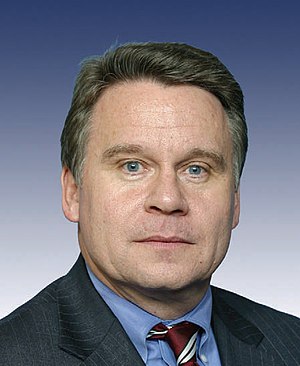 Image via Wikipedia
Image via WikipediaStill, too many adults and children victimized as modern-day slaves.
represents New Jersey's Fourth Congressional District
The fight against modern-day slavery marks a milestone this fall with the 10th anniversary of the U.S. Trafficking Victims Protection Act (TVPA).
When I first introduced this legislation in 1998, it was met with a wall of skepticism and opposition. For most people, the term trafficking applied to illicit drugs or weapons. Reports of growing numbers of vulnerable persons - especially women and children - being reduced to commodities for sale was often met with surprise, incredulity, or indifference.
Many people thought our bold new strategy - including asylum, sheltering, and other protections for the victims; long jail sentences and asset confiscation for the traffickers; tough sanctions for governments that failed to meet minimum standards - were solutions in search of a problem. Oh, how they were wrong.
Finally, after two long years, the TVPA became law on Oct. 28, 2000.
The State Department's Trafficking in Persons Office - created by the TVPA - estimates that more than 12 million people worldwide are trafficked. Others put the number as high as 27 million. Trafficking is the third most lucrative criminal activity in the world, with profits estimated at more than $31 billion a year.
One measurement of progress in this fight is the annual Trafficking in Persons Report, a detailed assessment of every nation's efforts in this area. Based on the reports, we know we are making progress. With a combination of encouragement, persuasion, and sustained pressure via sanctions imposed by the United States, countries around the world have created or amended more than 210 laws to combat human trafficking, and in the past two years alone an estimated 80,000 victims have been identified and assisted worldwide.
In addition, the TVPA has resulted in Anti-Human Trafficking Task Forces in 40 U.S. cities. These task forces coordinate local and federal law enforcement to rescue victims, refer them to appropriate rehabilitative services, and prosecute traffickers. Almost 900 American children have been rescued from sexual exploitation, ranging from truck-stop and Internet prostitution to pornography. More than 500 pimps, madams, and others who exploit children have been convicted at the state and federal levels.
Progress has also been made in combating adult trafficking. Since enactment of the TVPA through 2009, 645 traffickers were charged in the United States, an increase of 579 percent, and 466 traffickers were convicted. More than 90 criminal enterprises were disrupted, and 44 were dismantled.
Still, the National Center for Missing and Exploited Children believes that at least 100,000 American children are exploited in the commercial sex industry each year. These children, when found, are often wrongly charged with prostitution, fined, or put in juvenile detention, and then released back to the streets and their traffickers. Instead, these children must be recognized as the victims the TVPA declares them to be and offered rehabilitation to break free from the emotional chains of abuse.
We must also demand that corporations cease any and all facilitation of sex or labor trafficking. Craigslist got the message and shut down its U.S. "adult services" page in September.
And we must ensure the travel industry is on the alert for trafficking victims. The Airline Ambassadors' Child Trafficking Initiative provides flight crews with the basic information they need to notice trafficking and notify law enforcement. American Airlines has taken the lead in training their flight crews, and I urge every airline to follow suit.
A related issue, sex tourism, is an escalating threat to the children of every country. Legislation I introduced, International Megan's Law, has passed the House and is now pending in the Senate. It provides notification to a foreign government when a convicted U.S. sex offender who poses a danger to children is planning to visit. The bill also encourages foreign governments to establish a registry of its dangerous offenders and to notify the United States when offenders plan to travel.
Much has been accomplished during the decade - instances of human trafficking have been prevented, victims have been rescued and protected, and traffickers have been prosecuted and thrown into jail. Major challenges, however, remain. It falls to each of us - and like-minded people everywhere - to wage an unceasing campaign to eradicate human trafficking.
Contact Chris Smith via http://chrissmith.house.gov/.
Source: The Phillidelphia Inquirer


No comments:
Post a Comment